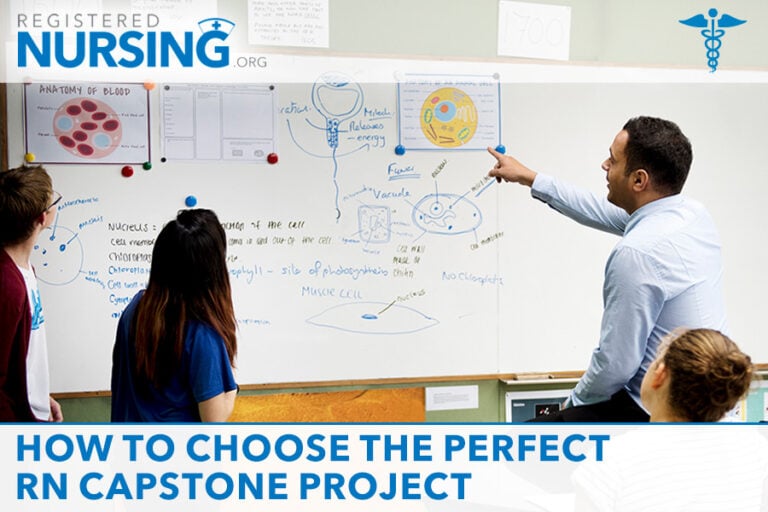How to Choose the Perfect RN Capstone Project: A Complete Guide for Nursing Students
- What is a Nursing Capstone Project?
- Nursing Degree Levels Requiring Capstone Projects
- How Capstone Projects Fit into the Nursing Curriculum
- Key Steps to Choosing Your Nursing Capstone Project
- 10 Innovative Nursing Capstone Project Ideas for 2025
- Keys to Capstone Project Success
- Embracing the Capstone Journey
- Additional Resources
- Latest Articles & Guides

Selecting the right capstone project is a pivotal moment in any nursing student’s academic journey. As the culminating experience of your nursing education, your capstone project demonstrates your ability to synthesize knowledge, apply evidence-based practice, and address real-world healthcare challenges. This comprehensive guide will walk you through everything you need to know about nursing capstone projects, from understanding their purpose to selecting a topic that aligns with your professional goals.
What is a Nursing Capstone Project?
A nursing capstone project is a substantial scholarly undertaking that represents the pinnacle of your nursing education. Unlike regular coursework, capstone projects require you to identify a specific healthcare issue or knowledge gap and develop an evidence-based solution or improvement initiative. These projects typically span one to two semesters and involve:
- Conducting a thorough literature review
- Identifying a clinical problem or opportunity for improvement
- Developing an implementation plan
- Collecting and analyzing data
- Evaluating outcomes
- Presenting findings to faculty and peers
Nursing Degree Levels Requiring Capstone Projects
Different nursing degree programs have varying capstone requirements, with increasing complexity at higher academic levels:
BSN (Bachelor of Science in Nursing)
Many BSN programs incorporate capstone projects during the final year of study. At this level, capstones typically focus on:
- Evidence-based practice implementation
- Quality improvement initiatives
- Health promotion projects
- Patient education programs BSN capstones are usually smaller in scope than graduate-level projects, with more faculty guidance and structured parameters.
MSN (Master of Science in Nursing)
Virtually all MSN programs require a capstone project that demonstrates advanced knowledge in the student’s specialty area:
- Nurse Practitioner tracks often focus on clinical practice improvements
- Nursing Education tracks may develop curriculum or teaching innovations
- Nursing Administration tracks typically address leadership or organizational challenges MSN capstones require greater independence, methodological rigor, and alignment with advanced practice competencies.
DNP (Doctor of Nursing Practice)
The DNP degree capstone (often called the “DNP Project”) serves as the centerpiece of doctoral education:
- Projects must address significant practice issues with system-wide implications
- Implementation must be evidence-based and theoretically grounded
- Outcomes should demonstrate measurable improvements in healthcare quality
- Projects often include policy implications or recommendations DNP capstones represent the highest level of practice scholarship and typically require 3-5 semesters to complete.
PhD in Nursing
While PhD nursing programs focus on original research dissertations rather than capstones, some programs incorporate preliminary capstone experiences to prepare students for dissertation work.
How Capstone Projects Fit into the Nursing Curriculum
Capstone projects are strategically positioned within nursing programs to serve as the bridge between academic learning and professional practice. They typically occur during the final phase of your program after you’ve completed core coursework and clinical rotations. This placement is intentional, as it allows you to:
- Apply Integrated Knowledge: Draw upon theories, research methods, and clinical skills accumulated throughout your program
- Demonstrate Leadership Competencies: Showcase your ability to lead healthcare initiatives and collaborate with interdisciplinary teams
- Develop Advanced Practice Skills: Refine critical thinking, problem-solving, and project management abilities
- Build Professional Identity: Align your project with career goals and specialty interests
Most nursing programs allocate 6-9 credit hours for capstone work, requiring approximately 100-300 clinical hours depending on your program’s requirements and accreditation standards.
Key Steps to Choosing Your Nursing Capstone Project
Step 1: Reflect on Your Clinical Interests and Career Goals
Before exploring potential topics, take a moment to reflect on your professional aspirations. Your capstone project should align with your specialty focus and career trajectory. Ask yourself:
- What area of nursing am I most passionate about?
- What healthcare challenges have I observed in my clinical rotations?
- What skills do I want to develop further?
- Where do I see myself working after graduation?
Step 2: Identify Relevant Healthcare Needs
Successful capstone projects address genuine healthcare needs or knowledge gaps. Consider:
- Quality improvement opportunities in your clinical setting
- Recurring patient safety issues
- Health disparities affecting specific populations
- Implementation of new evidence-based practices
- Technology integration in healthcare delivery
Step 3: Evaluate Feasibility and Resource Requirements
Not all worthy projects are realistic within your program’s timeframe and resources. Assess:
- Project scope and complexity
- Access to necessary data and populations
- Required technology or tools
- Time constraints
- Faculty expertise and support
- Potential ethical or IRB considerations
Step 4: Consult with Faculty Advisors and Clinical Mentors
Faculty advisors provide invaluable guidance in refining your project focus. Schedule consultations to:
- Discuss potential topics
- Explore methodological approaches
- Identify potential challenges
- Connect with clinical partners
- Review program requirements and expectations
10 Innovative Nursing Capstone Project Ideas for 2025
Looking for inspiration? Consider these timely and relevant capstone project areas:
- Telehealth Implementation: Develop protocols for expanding telehealth services in primary care or specialized settings, addressing accessibility challenges for rural or underserved populations.
- AI-Assisted Clinical Decision Support: Evaluate the effectiveness of artificial intelligence tools in supporting nursing judgment and improving patient outcomes in specific clinical scenarios.
- Cultural Competency in Healthcare Delivery: Create and implement cultural competency training programs to improve care quality for diverse patient populations.
- Nurse Burnout Prevention: Design and test interventions to reduce burnout and improve resilience among nursing staff, particularly in high-stress units.
- Transitional Care Models: Develop innovative approaches to reduce hospital readmissions through improved discharge planning and follow-up care coordination.
- Simulation-Based Education: Create simulation scenarios for specific clinical skills or situations to enhance nursing education or staff development.
- Healthcare Sustainability Initiatives: Implement and evaluate waste reduction, energy conservation, or sustainable practice measures in healthcare settings.
- Mental Health Integration in Primary Care: Design protocols for screening, referral, and follow-up of mental health conditions in primary care settings.
- Disaster Preparedness: Develop comprehensive emergency preparedness protocols for healthcare facilities, incorporating lessons learned from recent public health emergencies.
- Patient Engagement Technology: Evaluate the impact of patient portals, mobile health applications, or wearable devices on patient self-management and outcomes.
Keys to Capstone Project Success
Regardless of your chosen topic, successful capstone projects share common elements:
- Clear, Measurable Objectives: Define specific, achievable goals that demonstrate clinical impact
- Strong Theoretical Foundation: Ground your project in relevant nursing theories and frameworks
- Robust Methodology: Select appropriate methods for implementation and evaluation
- Interprofessional Collaboration: Engage stakeholders from diverse disciplines
- Practical Implementation Plan: Create detailed protocols that others could replicate
- Meaningful Evaluation Strategy: Develop tools to measure outcomes and demonstrate value
Embracing the Capstone Journey
Your nursing capstone project represents more than just a graduation requirement—it’s an opportunity to contribute meaningfully to healthcare improvement while positioning yourself as a nursing leader. By selecting a topic aligned with your passions and career goals, you’ll not only fulfill academic requirements but potentially create lasting change in healthcare delivery.
Remember that the journey of completing your capstone project is as valuable as the final product. Embrace the challenges, seek guidance when needed, and recognize that this experience develops critical competencies you’ll carry throughout your nursing career.
Additional Resources
Before finalizing your topic, explore these valuable resources:
- Your university’s capstone project guidelines and archives
- Professional nursing organization websites related to your specialty
- Healthcare improvement initiatives in your state or region
- Faculty research interests and ongoing projects
- Clinical facilities’ quality improvement priorities
Latest Articles & Guides
One of the keys to success as a registered nurse is embracing lifelong learning. Our articles and guides address hot topics and current events in nursing, from education to career mobility and beyond. No matter where you are on your nursing journey, there’s an article to help you build your knowledge base.
Browse our latest articles, curated specifically for modern nurses.



